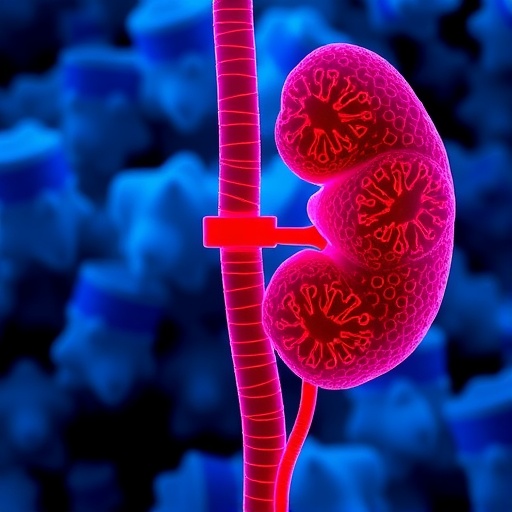
In the rapidly evolving field of organ transplantation, the compatibility between donor and recipient extends beyond mere blood types. Recent research highlights the increasingly complex interactions at the genomic level that contribute significantly to transplant success. The groundbreaking study led by Shoebridge and colleagues delves into genomic donor-recipient mismatches in kidney transplantation, emphasizing the vital role that genetic compatibility plays in clinical outcomes. This exploration sheds light on not just the implications of mismatches, but also the innovative techniques and approaches currently being utilized to address these challenges in transplantation medicine.
Kidney transplantation remains one of the most effective treatments for end-stage renal disease. However, the success of the procedure hinges on numerous factors, primarily the biological compatibility between the donor organ and the recipient’s immune system. Historically, compatibility assessments have centered around HLA (human leukocyte antigen) typing, which helps to minimize the risk of organ rejection. Nevertheless, recent advancements have revealed that HLA typing alone may not sufficiently predict transplant outcomes. Mismatches at the genomic level can significantly influence immune responses, with far-reaching implications for graft survival.
The study presented in “Current Transplantation Reports” underscores the necessity of a more comprehensive understanding of how genomic mismatches affect kidney transplantation. These mismatches can arise from variations in single nucleotide polymorphisms (SNPs), copy number variations (CNVs), and other genomic structural variations that are not accounted for in traditional HLA assessments. Even when HLA typing indicates a match, the presence of significant genomic disparities can lead to rejection, ultimately endangering the patient’s health and the longevity of the transplanted organ.
Shoebridge and his team utilized a combination of genomic sequencing technologies to assess donor-recipient compatibility comprehensively. Their research highlights the importance of high-throughput sequencing as a vital tool in revealing hidden genomic mismatches that conventional methods may overlook. By employing whole-exome sequencing (WES) and whole-genome sequencing (WGS), the authors were able to identify critical mismatches that directly correlated with rejection events in transplant patients. This level of detail marks a pivotal shift in transplant medicine, as the precision of genomic data enables clinicians to make more informed decisions regarding donor selection.
One of the standout features of this research is its emphasis on the inherent variability among individuals’ immune responses to transplant. The authors postulate that recognizing discrepancies in immune-related genes between the donor and recipient can help to predict and mitigate the likelihood of rejection. This approach moves the field towards a more personalized medicine model, in which each patient receives tailored interventions based on their unique genetic makeup. Such adjustments could include preemptive immunosuppression strategies or the development of novel therapeutic agents to enhance graft acceptance.
In analyzing the implications of genomic mismatches, the research also addresses the potential for regulatory mechanisms that could be harnessed for therapeutic purposes. For instance, the manipulation of cytokine signaling pathways might promote tolerance in recipients who are at risk for rejection due to genomic discrepancies. By strategically targeting these biological pathways, clinicians could improve long-term graft survival rates while minimizing the adverse effects associated with traditional immunosuppressive therapies.
Furthermore, the discussion in the paper touches on ethical considerations surrounding donor selection and the application of genomic technologies in transplantation. As the potential for greater compatibility prediction grows, so too do questions regarding how this information might be used. Potential biases in donor-recipient matching could emerge if genomic data drive decision-making processes, leading to disparities in access to transplantation based on genetic profiles. It is imperative that the transplant community engages in robust ethical discussions surrounding the use of such advanced technologies, ensuring equitable practices that benefit all patients regardless of their background.
As organ transplantation continues to advance, the work of Shoebridge and his colleagues acts as a clarion call for further research into genomic mismatch identification. Their findings set the stage for future studies that can refine the criteria for donor-recipient matching and foster new avenues for immunological interventions. The implications extend beyond kidney transplantation; insights gleaned from genomic mismatch research could potentially revolutionize other areas of organ transplantation and transplantation-related immunology.
The study further highlights the importance of multidisciplinary collaboration in advancing the field. By bridging the gap between geneticists, immunologists, and transplant surgeons, it becomes possible to foster a more holistic understanding of how genomic factors contribute to transplant outcomes. The convergence of expertise from various fields empowers the research community to devise comprehensive solutions to the challenges posed by donor-recipient mismatches.
In conclusion, investigating genomic donor-recipient mismatches offers a promising frontier in the pursuit of optimizing kidney transplant outcomes. The research presented by Shoebridge and colleagues advocates for a paradigm shift in how compatibility is assessed, moving from traditional models to a more intricate analysis of genomic factors. By understanding the finer details of genetic interactions, the transplantation community can enhance graft survival while paving the way for innovations that bring personalized medicine into the realm of organ transplantation. As these concepts continue to gain traction, the potential for improved patient outcomes becomes ever more tangible, highlighting the critical nature of ongoing research in this vital area of medicine.
In the years to come, the integration of genomic data into clinical practice will arguably transform how we approach organ transplantation. Maintaining an ethical framework, fostering collaborations, and embracing innovation will position healthcare professionals to harness these scientific advancements responsibly. As we look forward, it seems apparent that addressing genomic mismatches might not only bolster the field of kidney transplantation but could ultimately lead to more effective strategies in treating organ rejection across the entire medical landscape.
Subject of Research: Genomic Donor-Recipient Mismatches in Kidney Transplantation
Article Title: Genomic Donor-Recipient Mismatches in Kidney Transplantation: A Focus on the Techniques and Approaches
Article References:
Shoebridge, S., Heinzel, A., Kammer, M. et al. Genomic Donor-Recipient Mismatches in Kidney Transplantation: A Focus on the Techniques and Approaches.
Curr Transpl Rep 12, 36 (2025). https://doi.org/10.1007/s40472-025-00492-6
Image Credits: AI Generated
DOI: 10.1007/s40472-025-00492-6
Keywords: genomic mismatches, kidney transplantation, HLA typing, immunosuppression strategies, personalized medicine, organ rejection, high-throughput sequencing, cytokine signaling, ethical considerations, multidisciplinary collaboration.
Tags: biological compatibility in transplantscomprehensive understanding of transplant immunologydonor-recipient compatibilityend-stage renal disease treatmentgenetic factors in transplant successgenomic mismatches in kidney transplantsHLA typing limitationsimmunological responses in organ transplantationinnovative techniques in transplantation medicinekidney transplantation advancementsorgan rejection risk factorstransplant outcome prediction methods




